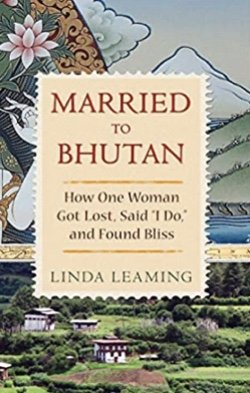Married to Bhutan by Linda Leaming (Hay House)
When Linda Leaming told people that she was leaving the states to live in another country. a common response was “Butane? Where’s that?” Oh,” she began to tell people,” It’s near Africa. It’s where all the disposable lighters come from.”
A tiny, mountainous country that shares its borders with Nepal, Bangladesh, China, and India, Bhutan has an agrarian, cohesive population that would fill a medium-sized U.S city. Historically isolated by its geography that holds only five habitable valleys and its weather, that often makes any sort of invasion problematic, including aircraft landings, it’s a country that has developed on its own terms. Currency replaced the barter system in the 1960s, both the Georgian and the lunar calendars are observed, and time is cyclical, not linear, based upon the seasons and the belief in reincarnation. Its king voluntarily abdicated in 2006 to make room for a democratic form of government and espouses a system that prioritizes Gross National Happiness, rather than Gross National Product. It has never been colonized, with astute monarchs that made Bhutan one of the few winners in Britain’s South Asian Great Game.
Leaming fell in love with the place in 1994, when she was one of the scant number of tourists to visit it. After two weeks in Bhutan, this 39-year-old American, whose daily life was removed from it by twelve time zones, was captivated. After two more journeys that cemented her feelings, she found a job teaching English and moved there in 1997. It’s been her home ever since.
Candid about her initial difficulties with culture, language, and manners, which she describes as a time of facing “minefields, so many opportunities to make an ass of yourself,” Leaming is too busy learning what she needs to know to indulge herself in the usual expat self-pity. Dzongha, the national language of Bhutan, is her primary preoccupation in which she’s frustrated by her teacher’s insistence that reading and writing come before speaking. Her oral language learning is a clandestine activity, aided by a phrasebook that gives her crucial tools to use at work, in the market, and at a doctor’s office. Unfortunately she’s enchanted by phrases that she’ll never have reason to use, which stick with her and emerge at inappropriate moments. The day she thinks she’s asking a physician a routine pleasantry and discovers his shock when it comes from her mouth as “Take off your clothes and lie down,” ought to be quelling but probably was not. Leaming is too eager to assimilate for chagrin to stand in her way.
Her language acquisition becomes total immersion when she falls in love with another teacher, a painter of thanka, works of religious art that are highly prized in Bhutan. He’s a man from a highly traditional family who lives in a large apartment within his sister’s home and when he and Leaming decide to marry, he’s reluctant to take his bride away from the hot water heater of her Bhutanese home to a small town.
But Leaming is aware that when she marries this man, she’s also marrying his country and insists the two of them live in her husband’s home. Here she discovers that her domestic skills are decidedly below par and relearns how to sweep, wash clothes, cook, and sew. In a town where almost everything is made locally, with a husband who wore deerskin moccasins made by his father and clothes woven by his mother, Leaming feels that she’s married to “the Last of the Mohicans.”
Her personal anecdotes are quite funny and rather sparse. Leaming’s focus is on the country that has let her become a resident as much as on how it has changed her. Buddhism is integral to every part of Bhutanese life, a daily practice rather than beliefs espoused on Sunday. From the obscene, scatalogical 15th-Century monk whose used underparts are still enshrined near her house to the elaborate, medieval process of her husband’s thanka art, Leaming’s life is pervaded with a system that gradually becomes part of her. So does the beauty of her surroundings which she loves best during the severe cold of winter and the barriers against rapid progress that geography and weather still forestall. She learns to savor the slow pace of her life, in which buying stationery involves going to a spot where handmade envelopes are constructed as she waits, finding sealing wax in an over-stuffed shop with a patient shopkeeper, and falling prey to the seduction of Bhutan’s gorgeous postage stamps.
Bhutan is under threats, Leaming describes in her final essay. Surrounded by a “geopolitical equivalent to a trailer park,” with its squabbling tribes, avaricious leaders, and drug problems, it works hard to avoid the fate of the former kingdom of Sikkim which is now an Indian state. Climate change is melting its glaciers and flooding is a constant danger. Conversely there’s a shortage of water that may destroy the country’s agriculture. And. as is true all over the world, globalization is closing in through the inexorable incursions of the internet.
“The world needs Bhutan,” Leaming concludes. Certainly she herself needed it. As a Bhutanese friend told her early on, “You are the arrow that hit its mark.” Her lovely little book poses an irresistible question: how many of us are still arrows in search of our own marks?~Janet Brown
